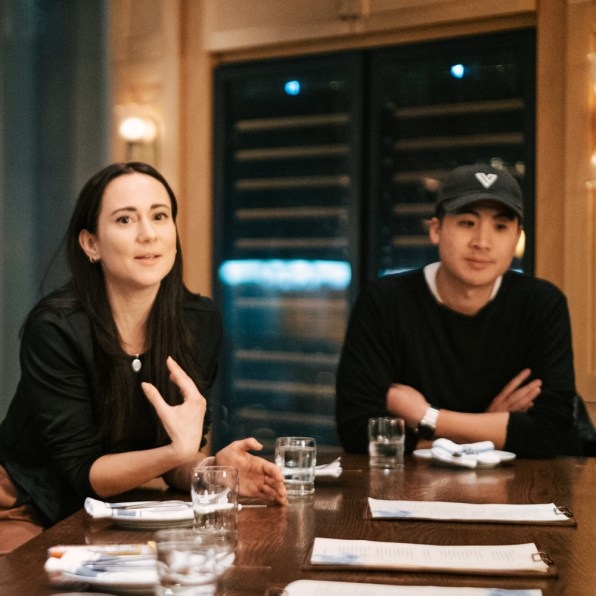Last fall, John Timmerman, founder and CEO of digital marketing agency Good Monster, had a problem. He’d lost three clients through no fault of his own—acquisitions, startups running out of funding, the list goes on—but now he was responsible for the decision that came next. Lay off good performers or keep them even though the company was already losing thousands? Timmerman texted the group chat. Or, rather, in this case, he asked his cohort at Hampton, a new community for entrepreneurs, founders, and CEOs. Timmerman told his story, then others shared their experiences. (Timmerman is not at liberty to disclose what other people said). At the end of the conversation, Timmerman knew exactly what he had to do to move forward.
Conversations like this, are exactly why Sam Parr and Joe Speiser started Hampton. Parr is the cohost of the popular podcast My First Million and founder of The Hustle, a media company acquired by HubSpot. Speiser is a serial entrepreneur and three-time founder. The duo met a decade ago and built a fast friendship. Parr is magnetic with a booming voice—at the beginning of the interview he was full of bounce, in the middle he flagged and wandered off-screen to grab a beverage, and by the end he bounced back up again. Speiser’s energy is a slower, steadier burn—he remains calm and unfazed no matter what question comes his way. It’s easy to see how their personalities complement one another. “We talked about all kinds of questions like: How do I handle work-life balance with my spouse, or should I get married?” Parr says.

Over time, they were able to connect with other founders looking for support but realized that for many founders and CEOs who don’t live in tech or business hubs like San Francisco or New York, these communities remain inaccessible. “We have a lot of friends in the Midwest, or in smaller communities, and they are the oddballs,” Parr says. “They don’t have these people to chat with. We thought, let’s create a company where we can make it easy for people who grow and build companies to collaborate and connect.”
They started Hampton last June, acquired their first members in July, and had the website up by December—even though they only formally debuted the company in late March. Today, Hampton boasts 270 members; membership costs $8,500 a year, and applicants are vetted before being admitted. They must lead fast-growing, tech-enabled startups; have revenue of at least $1 million annually or have raised at least $3 million; or have sold a startup for $5 million. In addition, they must be located in either North America or the U.K. Members also go through an interview to make sure they are a good fit for the community, the biggest factor being that they’re able to have vulnerable conversations. “You can’t be an asshole,” says Speiser. “We want to make sure this is a place people enjoy coming to. If someone talks all about their wins and isn’t willing to share anything vulnerable, this is not going to be the spot for them.”
Members sign a privacy pledge and are divided into groups of eight that meet on Zoom once a month for about two hours. Sessions are led by a facilitator and groups are assorted by company size. (There are also in-person meetups and guest speakers.) Hampton ensures that there’s enough similarity among members that they can learn from each other, but enough diversity that no one is in direct competition. Janessa White, cofounder and CEO of the wedding planning company Simply Eloped, credits her facilitator with her group’s ability to have deep, thoughtful discussions. “[Our facilitator] is also a CEO coach,” White says. “If someone doesn’t want to share, she’ll share, and it’ll open up avenues for us. She’s also great at laying out the expectations: Cameras must be on, we all have to be present.” White hails from Idaho and points out that while she’s managed to build a support network over time, it hasn’t always been easy to find like-minded people, particularly those she can learn from and grow. At a recent Hampton meeting, she was able to discuss balancing loyalty to her early-stage employees versus calling out bad behavior. “Talking it through with people who’d gone through this helped me be at peace, made me feel less alone, and be resolute in how I can prevent this from happening again,” she says.

Harry Kraemer, former CEO of healthcare company Baxter and a professor at Northwestern’s Kellogg School of Management, points out that this idea is nothing new—which both Speiser and Parr acknowledge. Parr has been vocal in acknowledging the role that YPO; Chief, the social network for women executives; and the high-net-worth organization Tiger 21 had in influencing Hampton.
“Every CEO is busy,” Kraemer says. “You get tons of invites, so a network like this will really have to offer something unique to succeed.” While community is helpful, he points out that anyone who makes it to CEO is already good at building community, by nature. “You don’t become CEO by knowing the answers,” he says. “You become CEO by knowing the people who have the answers.”
By contrast, Wharton professor Michael Useem sees the growth of networks like Hampton as more of a “let many flowers bloom situation.” In his view, the complexity of our current landscape means that there are more unique leadership challenges than ever before, which creates a larger need for community. CEOs can derive an enormous amount of value from learning from others in similar stages. He mentions that several CEOs of his acquaintance cultivating informal groups where they could discuss work issues frankly. “The inner circle to solve problems can be crucial,” he says. However, he notes, it’s important that, in general, CEOs cultivate wide networks—both of like-minded people and diverse groups in order to ensure that they aren’t locked in their own echo chamber. “Talk to everyone, basically,” he says.

For Timmerman, Hampton has been a way to get to know the people who have the answers. After listening to everyone else’s stories, he realized that he needed to rethink his company’s entire business model. He cut some clients, restructured the firm, and today, while revenues are lower, he says that Good Monster is more profitable. “Hiring a mentor or following someone on social media is not the same,” he says. “You see all the wins. You don’t get to see what happens behind the scenes.”
(5)









